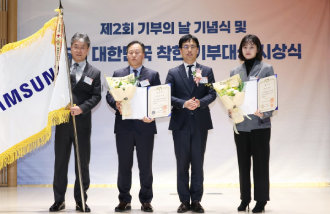Current Status Of Women’s Rights: Laws - The Level Of Developed Countries… Reality - Male Superiority
Current Status Of Women’s Rights: Laws - The Level Of Developed Countries… Reality - Male Superiority
Posted July. 01, 2001 21:10,
Ms. Kim (42. Female) has seven years of experience as a director from her 15-year work experience with the insurance company. Although she applied for a director position in a life insurance company last year, she was rejected. When she asked what was the reason for the rejection through a phone call, a company official said that ``although the resume and work experience looks fine, we do not, and will not in the future, select a female director.``
Ms. Nam (28), a female worker who began to work at a paper manufactory last year, was surprised when she participated in an induction course for the new employees. Of six new employees, only two male workers were hired as regular employees, while the rest four female workers, including herself, were one-year contract workers. She realized that this was the way the manufactory had been hiring new employees since the foreign exchange crisis.
- Domestic Laws are on the level of the developed countries: According to the Korean Women’s Development Institute (KWDI), a total number of legislated bills and reformed bills concerning the women’s rights since 1948 is 287. Especially, 49 bills, including Sexual Equality Employment Act and Family Laws, in 1980s, 173 bills in 1990s including Special Act Concerning the Punishment of Sexual Crimes and Protection of Victims, Act on the Prevention of Domestic Violence and Victim Protection, Framework Act on Women’s Development, were legislated or reformed. If it is `according to the law`, the time for gender equality is likely to come in the 21st century.
However, these laws and systems do not have effectiveness in reality. Not only the society does not pay attention to these, but also women are not aware of the existence of these laws and systems. The current constitution clearly states the prohibition of discrimination based on sex in every field, security act on the individual dignity and sexual equality in marriage and family life, and the nation’s endeavor to protect the maternity. Sexual Equality Employment Act prohibits discrimination against women in the field of recruitment, employment, education, posting, promotion, retirement age, dismissal, and retirement. It also prohibits the employment standard that takes into account women’s appearance. Act on the Prevention of Sexual Discrimination and Redemption also prohibits sexual discrimination and sexual harassment during the process of employment, education, and enforcement of laws and policies.
- Reality, far from the laws: However, laws and reality are far from each other. Wong In-Sun, a chief of the policy making committee at the Korean Women Workers Association, said that ``companies often announce that they `hire men exclusively ` in their recruitment advertisement. They also do not even accept women’s application.``
She also pointed out some of the cases that violate the existing laws. For example, companies set up the different retirement age for men and women workers in the same occupation; companies lower the retirement age in certain occupations in which the number of women workers is higher; and companies directly or indirectly enforce the dismissal of the intra-office couples or the husband-wife both working. According to the result from the monitoring of the employment advertisement by the Korean Womenlink (Hankuk Yeosung Minwoohoi), of 599 cases of violation, 95 cases (22 percent) allowed only men to apply for the job, 54 cases (12 percent) differentiated the occupation and rank, 187 cases (44 percent) required exclusively women for the positions of secretary, sales, office work, and accounting clerk.
Jung Yang-Hee, chairperson of the Seoul Women Workers Labor Union, said that ``after the enforcement of the Sexual Equality Employment Act, sexual discrimination has been changing its course to the form of employment, such as the contracted employment.`` According to the National Statistical Office (NSO), the rate of the women in the contracted jobs among women workers has increased from 62 percent in 1997 to 69.7 percent last year. More than the half of the employees in the entire contracted jobs consisted of women workers.
- Women’s rights are on the level of the developing countries: According to the United Nations Development Programme (UNDP), South Korea ranked 63 out of 70 in the index of women’s rights, which was estimated based on the rate of women occupation in the national assembly, the rate of women in the administrative management occupation, and the rate of professional women. However, it is not easy to detect the sexual discrimination in the posting and promotion in the company. According to the KWDI’s survey to the 100 companies, selected based on the amount of sales, there was discrepancy between the company’s policy on the women’s promotion in the company and the reality. 89 percent of the company states that ``the promotion of women is as equally possible as the promotion of men,`` 10 percent states that ``the promotion of women is possible to a certain post,`` and 1 percent states that ``women are excluded from promotion.`` However, 78 percent of the companies has less than 2 percent of women managers, and 10 percent of the companies has more than 5 percent of women managers.
- Sexual harassment in the office: Since the Framework Act on Women’s Development included the Act on the Prevention of the Sexual Harassment in 1995, the sexual harassment related laws have progressed. The Sexual Equality Employment Act, which was reformed in 1999, and the Act on the Prohibition on the Sexual Discrimination and Redemption, which was legislated in 1999, have regulations on the prohibition of the sexual harassment and the education for the prevention of the sexual harassment. However, the reality does not follow the law. Choi Yong-Ai, director of the Korea Sexual Violence Relief Center, said, ``when educating for the prevention of the sexual harassment, sometimes people ask, `Is this sexual harassment?` Not only men, but also women ask such a question.`` Lee Sang-Duk, the director of the Sexual Discrimination Improvement Department in the Ministry of Gender Equality, said that ``in order for the problems of sexual harassment to be resolved, more education and advertisements are necessary.``
Soh Young-A sya@donga.com
Headline News
- South Korea’s migrant population surpasses five percent
- U.S. acting ambassador affirms joint exercises with South Korea
- China and Japan escalate dispute over naval radar incident
- Uptempo claims D3 Seoul basketball championship convincingly
- Democratic Party pushes insurrection court despite opposition warnings







